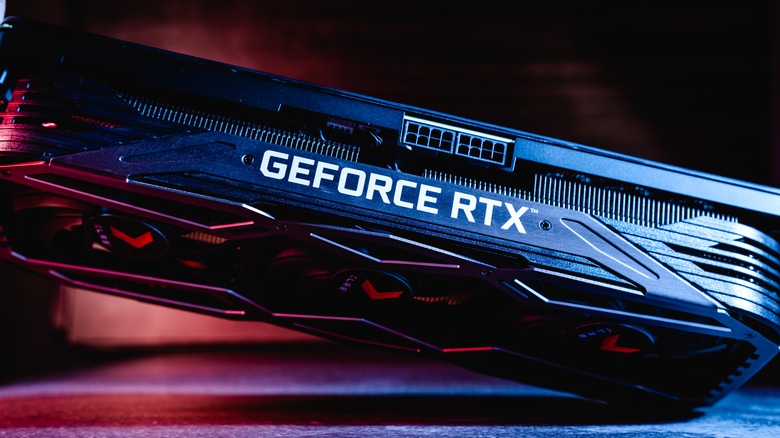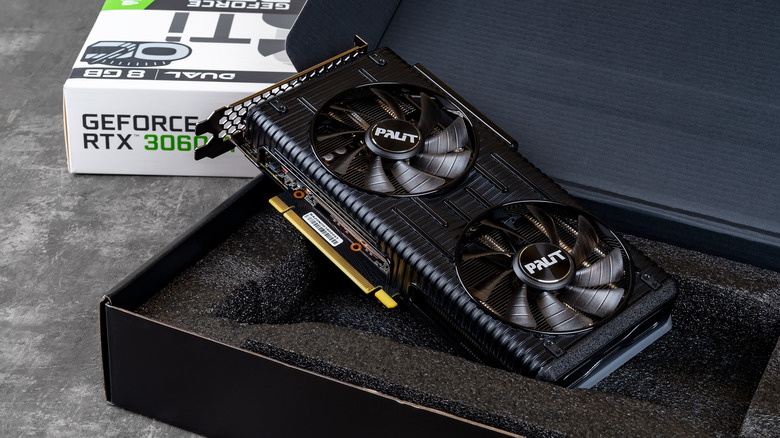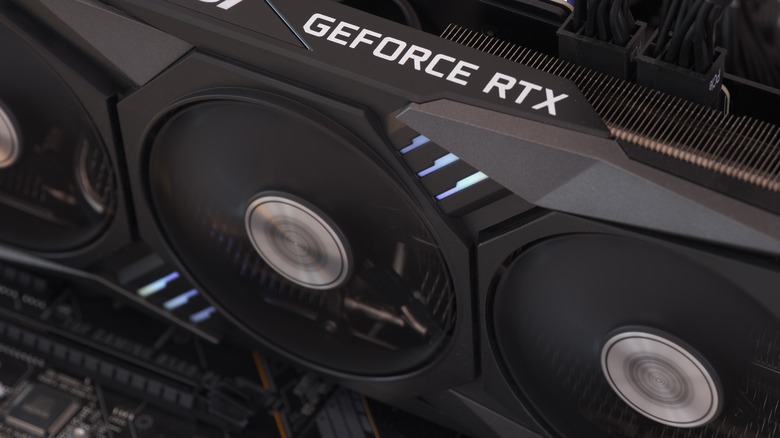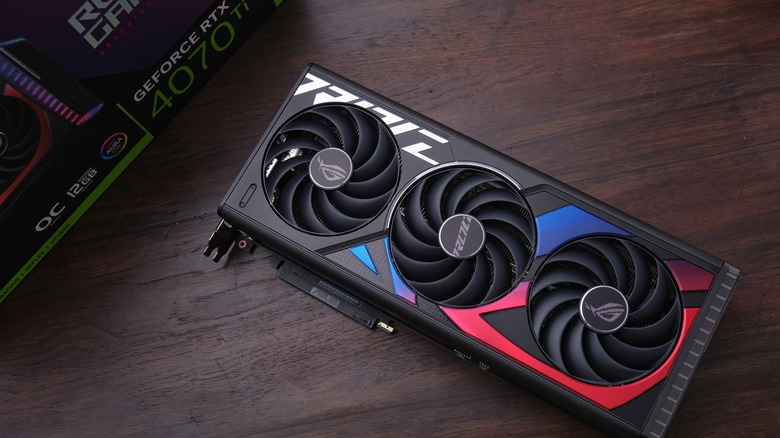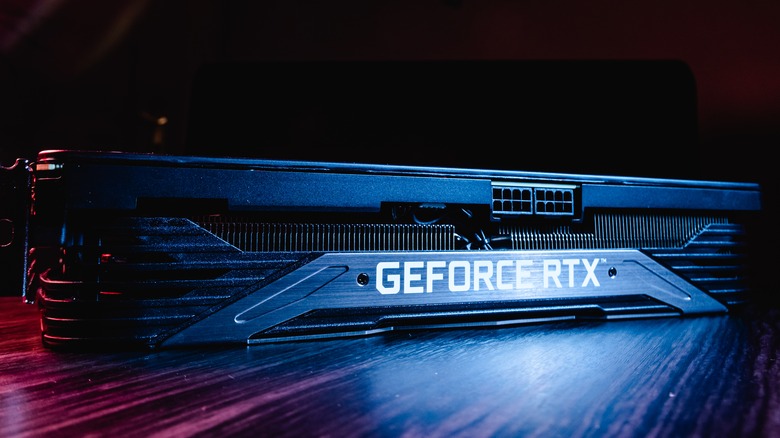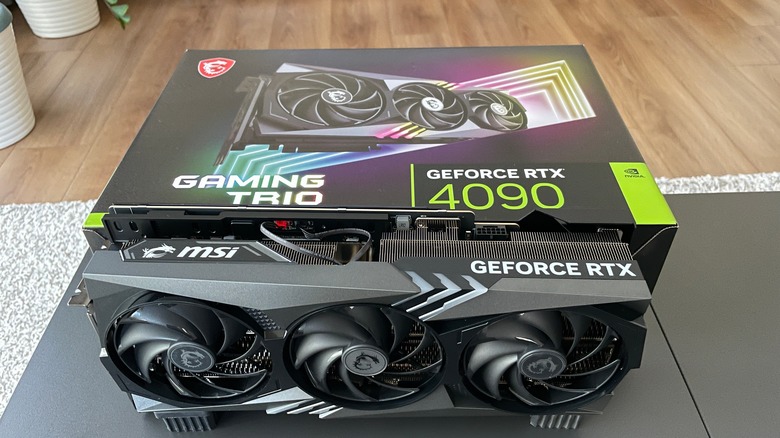5 Of The Best Nvidia Graphics Cards For Any Budget
If you want to get your game on, you need a solid graphics card (also called a GPU) that can run it properly. Nvidia makes some of the best GPUs and has been an undisputed market leader for years. However, Nvidia GPUs can get pricey, so not every card is worthwhile. Which one suits your particular needs and your budget? We're here to answer those questions.
Choosing the right graphics card for your PC build is the key to smooth gaming. Whether you're putting together a rig all by yourself or buying a pre-built, the graphics card and processor are the two components that have the most significant impact on your computer's gaming performance.
Do you want to play at 1080p, 1440p, or 4K? Are you gearing up to play all the latest titles, such as "God of War: Ragnarok" or "Forspoken," or are you more into indie games? Finally, how much can you spend? Ponder these questions and check out the GPUs below because we've got something for every budget.
Nvidia GeForce RTX 3060
Nvidia's RTX 3060 has been among the most popular GPUs in recent years. It no longer belongs to the latest generation, but it's still excellent value, and it will support 1080p gaming on high to max settings. If you want to balance cost and performance, the RTX 3060 is a budget-friendly solution that lets you play all the games you want.
Regarding specs, the GPU comes with 3584 CUDA cores, and its clock can be boosted to 1.78 GHz. The RTX 3060 can be found in two variants — one with 12 GB of GDDR6 memory and one with 8 GB. Despite being a cheap option, it gives you access to modern features that bolster graphics and increase performance, such as ray tracing and Nvidia Deep Learning Super Sampling (DLSS), an image upscaling technology. Keep in mind, however, that the RTX 3060 may not be able to keep up in many games when it comes to ray tracing.
The RTX 3060 is an affordable gateway to building a midrange computer. You can find it on Amazon, with prices ranging from $340 to $400, depending on the exact model you're buying. If you have a little wiggle room in your budget, you can also get an RTX 3060 Ti, which is close in price but has considerably better specs.
Nvidia GeForce RTX 3070 Ti
If you're angling more toward 1440p gaming than 1080p, the RTX 3070 Ti will be able to handle it, and it won't cost you an arm and a leg. Where the RTX 3060 may falter at 1440p, the RTX 3070 Ti should be able to run most games smoothly at that resolution, and that's on max settings.
Regarding specs, the RTX 3070 Ti features 6144 CUDA cores — a considerable step up from the RTX 3060. It's only available with 8 GB of GDDR6X memory, and the base model made by Nvidia itself has a boost clock of 1.77 GHz. While that's identical to the cheaper RTX 3060, the extra graphics cores make this GPU much more capable.
At current prices, the RTX 3070 Ti is usually more worthwhile than the RTX 3070. You can find it for as low as $630 on Amazon. If you want to save money but still play at 1440p, the RTX 3070 is a decent alternative.
Nvidia GeForce RTX 4070 Ti
Time to move on to the next generation of Nvidia GPUs. There are plenty more cards in the RTX 30-series, but the more expensive models are not worth it anymore — you can usually score a better deal on a card in the RTX 40-series. Despite the upgrade in specifications, the RTX 4070 Ti still fares better at 1440p than it does at 4K, but you can successfully game on a 4K monitor with this GPU if you compromise on some graphics settings in certain games.
This model has 7680 CUDA cores, 12 GB of GDDR6X memory, and a massively improved clock speed that can hit as high as 2.61 GHz. Moving on to the next generation of cards means accessing DLSS 3.0, Nvidia's latest supersampling technology that generates entire frames instead of just pixels.
You can usually find this GPU for around $800-$900 on Amazon. To get similar performance from a last-gen card, you'd have to buy the RTX 3080 Ti, and that card is a lot more expensive most of the time.
Nvidia GeForce RTX 4080
If you want to indulge in comfortable 4K gaming but don't quite need the best of the best, pick up the RTX 4080. It's powerful enough to let you game at 60 fps in 4K, which means playing on max settings without ray tracing enabled.
While it's better at ray tracing than the RTX 4070 Ti (and considerably so), there may be titles where you may not hit a steady 60 fps in 4K with ray tracing. For most gamers, this won't be a problem, but this is why it's not a top-of-the-line GPU — there are still things it can't do. However, compared to the flagship RTX 4090, it is cheaper and has a significantly lower power consumption.
The GPU has 9728 CUDA cores, a maximum boost clock of 2505 MHz, and 16 GB of GDDR6X memory. The total board power (TBP) was rated at 320W — a significant reduction from the 450W required by the RTX 4090. This GPU is a huge step down from the RTX 4090 and a sizeable upgrade from the RTX 4070 Ti.
You can usually find the RTX 4080 for $1,190 and upward, which is close to the initial selling price set by Nvidia. If the cost exceeds $1,350, you're usually better off adding an extra $200 to buy an RTX 4090 instead.
Nvidia GeForce RTX 4090
Nvidia's RTX 4090 sits at the top of the list of the best graphics cards for gaming. With ray tracing enabled, it'll fly through 4K gaming on max settings. It's also solid for professional use cases like video and photo editing or machine learning. The catch? It's costly. This is the best GPU you can get and the priciest GPU right now.
The RTX 4090 has specs that are nothing short of insane. It has 16,384 CUDA cores, a maximum clock speed of 2.5 GHZ, and a whopping 24 GB of GDDR6X VRAM. It has over 40% better specs than the RTX 4080, and it shows. Currently, there shouldn't be any games that the RTX 4090 can't tackle, and that's with all the settings at max and with ray tracing on.
While the RTX 4090 is an absolute beast, most gamers have no use for a graphics card that powerful. You should only buy it if you want the best and don't mind spending a lot of money. The prices of this card can vary, with the cheapest models hovering around $1,600 and the most expensive going well above $2,000.
